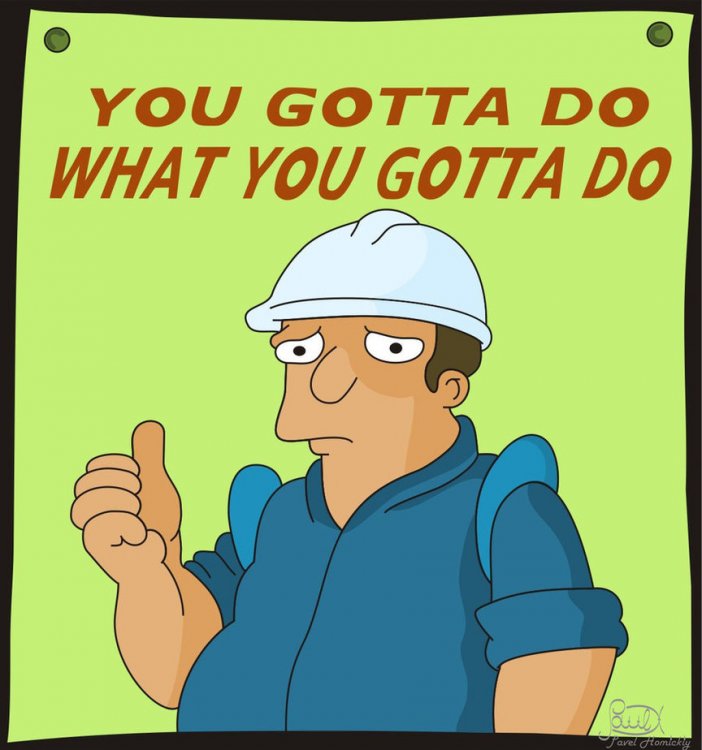Work, Identity, and Human Value
This entry will a bit more personal than the last few. Today I'd like to talk about how American society judges our worth and value as human beings. By and large, I feel like American society defines our worth as people by our ability to do a job and get paid for it. Financial independence is paramount in this culture, and we are often judged by whether or not we have it. Throughout my life, I've often felt like people in my culture believe that achieving financial independence is the single most important thing you can do, and failure to do so diminishes your very worth as a human being. Interestingly, it doesn't seem to matter much to people how much money you make, just that you support yourself. Indeed, if you make too much, that can make you a social pariah as well. What is of chief importance in this culture is that you work. Period. Identity and human worth is defined by work.
Think about how our social interaction begin--what is usually the first question one asks or is asked when meeting someone new: "What do you do?" I have been asked this many times, and I usually respond by listing, quite literally, the many things that I do. I swim, I read, I walk, I play video games, I sew, I design and make my own clothing, I make digital art, I 3-D model, I ice skate. "No, no, no," the inquirer would then say, "I mean, what do you do for a living?" Ah yes. Of course I am well aware that this is what they meant. My listing of all the activities that make up my life is my clever attempt to suggest that our identities are much more than our jobs, and that perhaps our hobbies and interests often say far more about us. If the person I'm talking to is someone I'm likely to see again, then I'll be honest and explain that I'm unemployed. I make a few bucks selling art online, but nothing you'd call income. I live with my parents, who support me. When a seemingly functional, intelligent 32 year-old man says this, many people's reaction is thinly veiled disgust. I reckon most people think something like, "Ugh. What the hell is wrong with you? How can you do that to your parents?? How can you live with yourself?!"
So much value is placed on what we do for a living--how we make money. If someone doesn't achieve financial independence, they are often regarded with disgust, contempt, and are shunned. Of course, this isn't the case if some has a "proper" excuse. If a person has Downs Syndrome, for example, they are obviously not thought badly of for not making money. How could they make money, after all? They are, in most cases, incapable of doing so. But there are many reasons why having a normal job might not work for someone. Take me, for example; I have high functioning autism, obsessive compulsive personality disorder, social anxiety, and clinical depression. I have had jobs before, but I was miserable in them, and couldn't continue them for very long. The workforce life just wasn't for me. My parents have always been very understanding, and were more than happy to support me and let me continue living with them. It works for us. It's not a burden for them. We are very happy together, and they love having me around. I wasn't lucky enough to invent a massively popular social networking site from my bedroom, so the best I can do is make my art, which I sell on Redbubble for a few measly dollars. But I do the best I can, and our arrangement works for us. I don't know what I'll do when my parents die, but for now, it works. Unfortunately, my problems are not deemed to be reasonable excuses by society. I am not literally, physically incapable of getting a real job, and therefore, I am viewed as a pathetic leech and a deadbeat for not doing so, even though my parents don't see it this way at all. My battle with depression has nearly claimed my life many times, and it has taken everything I have just to get where I am. I am happy to be alive at the moment, and proud of many things I've accomplished, but society doesn't see it this way. Others simply see me as a worthless drain on society--a lazy bum with no excuses. Perhaps this is because depression is little understood and not talked about much. Many people still think depression is just feeling "bummed out", that it can be ignored or beaten by just trying harder, or even that it's made up in the first place. I believed that it could be ignored and beaten by willpower for over fifteen years. That's the road that led me to be suicidal.
But I digress. Society doesn't approve of my lifestyle, because I appear to be perfectly capable of supporting myself, and yet I don't. Nevermind the fact that trying to work a normal job would probably destroy me and lead to me suicide. A better person would just push through and do it anyway. After all:
Now, despite what it sounds like, I'm really not trying to complain and play the victim card. This isn't supposed to be a "woe is me" rant, and I apologize if it sounds that way. The real purpose of this essay....or, I guess, ramble would be a better term...is to remind people not to be quick to judge others just because they don't do the "normal" society thing that is expected of them. You don't know their struggles or what their life is like.
I have worked hard to come back from the lowest points of my depression, and a huge hurdle for me has been simply accepting myself, and not hating myself, which is a common staple of depression. I try to metaphorically (and sometimes literally) hold my head a little higher when I go out in public, but it is very hard because I constantly fear that I am being harshly judged whenever I'm seen with my parents. I fear that everyone looking at me is thinking that I'm a bloodsucking leech and a deadbeat. At this juncture, I need to take a brief tangent to point out that in addition to achieving financial independence, American culture also places enormous importance on moving out of one's parents' house. Casting off the shackles of one's parents is a rite of passage, and living with one's parents as an adult is often thought of as greatest failure and humiliation one can endure. I am told this is not the case in other cultures. For example, I am given to understand that in Asian culture, it is very commonplace for several generations of family to remain together under one roof, and that adults with their parents in public is a common sight. Perhaps I'd be better suited for that culture? Who knows.
Some of these ideas are changing. Obviously, as we all know, far more adults live with their parents than did, say, back in the fifties. But I still feel this pressure and judgment from society. But there is more to a person than just their job, and there are other ways we can contribute to the world. I make art which, although it doesn't rake in the big bucks, does make people happy. I write, as I am doing now, to try to teach, open minds, and make the world a better place. I publicly try to break down unfair gender double standards. Even though I am male, I love fashion, and I have always loved dresses and feminine clothing, and I wear such things in public. Though it may sound strange, I'd like to think that in some small way, this helps to make the world a better place. I know this works, because I've been told several times by strangers that my courage inspired them to wear interesting things that they've always wanted to, but were too afraid to. I also wear my Pony shirts in public. I proudly cosplayed as EG RD to the movie. I hope that perhaps some young boys who may be afraid to show their authentic selves see this and learn that it's okay for them to be different. These may be little things, but I'd like to believe that the world is just a tiny bit better because I'm in it. And yet, I still feel that judgment, that I'm worthless because I don't work for a living.
I believe that we need to outgrow this feeling of tying our sense of identity, human value, and self-worth to our paid work. After all, there is a much larger picture unfolding here--as technology increases, we may one day invent AI and automation that eliminates the need for human drudgery. In fact, unless a disaster prevents this, it seems an inevitability. If we create the perfect intelligent machines, capable of building all other machines to do all work, manage all resources, and build for us a utopia, then we will need to evolve beyond the career identity paradigm. If there is ample wealth to go around, then we will need to find a way to feel deserving of such wealth simply by being alive, not because we punch a clock. We will have to find meaning in creative and recreational pursuits, rather than in doing the work that needs to be done.
That last paragraph was a rather orthogonal leap into a rather esoteric topic that one could easily write an entire book on. I only barely skimmed the surface, but I will leave it at that. Thanks for reading, and I hope you find my ramblings worthwhile.
-
 2
2




0 Comments
Recommended Comments
There are no comments to display.
Create an account or sign in to comment
You need to be a member in order to leave a comment
Create an account
Sign up for a new account in our community. It's easy!
Join the herd!Sign in
Already have an account? Sign in here.
Sign In Now